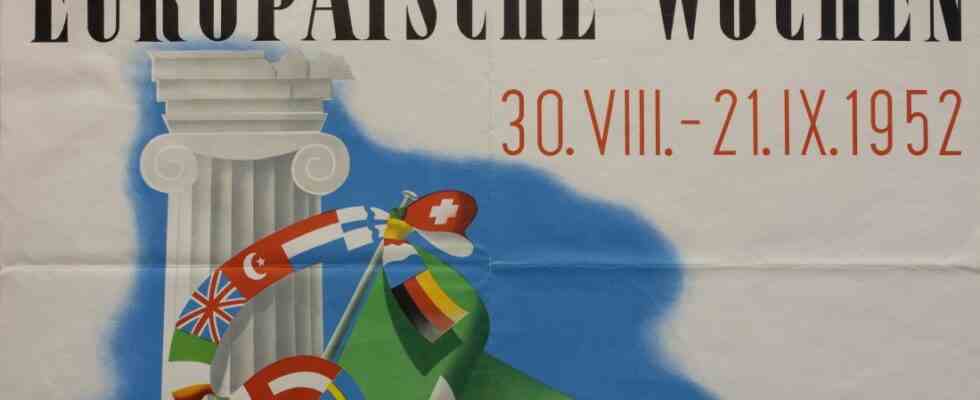Times were different than those European Weeks Passau (EW) premiered in August 1952. Not only music and culture were in demand – orchestra and organ concerts, a ballet evening and Mozart’s opera “The Marriage of Figaro” were on offer. Lectures about Europe also filled the halls. More than 2000 people wanted to hear Eugen Kogon, President of the Europa-Union Germany, speak about the “unification of Europe” in the Nibelungenhalle. Carsten Gerhard, the director of EW, is certain that such a concept would no longer work in 2022.
Much of what the EW founding fathers hoped for in Europe is now a reality. “We are now faced with other European challenges,” says Gerhard, to whom the festival’s political profile is important. That’s why his program with plays – for example, a free theater from Hungary is a guest – and performances takes up topics such as species protection or autocratic restrictions on freedom. “Ukraine Moments”, the exhibition at the Innkai, focuses on the current war, even if the photographs by the photographers Polina Polikarpova and Mikhail Palinchak show the country in a beauty that the war has made almost impossible. “We chose the works as a conscious contrast to the omnipresent images of destruction,” says Gerhard.
The “Salzburger Große Welttheater”, a play by Hugo von Hofmannsthal, 1957 at Passau Cathedral.
(Photo: D.Duyfjes)
The initiator of the festival was an American officer
On the occasion of the 70th anniversary, he wrote down the history of the festival in a brochure. The initiator was the American culture officer Robert Marvel Allen, who wanted to contribute to promoting the European idea with “festivals dedicated to European integration”. The Passau city council was impressed by the idea, especially since the officer promised financial and organizational support from the American authorities.
The success of the first few weeks was great, the Passau continued. In 1956 they installed the first director. Although Johannes Klein brought the big opera and theater performances he wanted to Passau, he was less interested in the European idea and there were also financial problems. In 1959, the city terminated his contract and canceled EW 1960. That got the citizens on the scene, who didn’t want to miss out on their festival. Hermann von Moreau, conductor and head of the Passau Concert Association, founded the association Festspiele Europäische Wochen Passau with like-minded people, which still supports the festival today. As artistic director, Moreau provided orientation towards Eastern Europe. The invitation of artists from the “Eastern Bloc” became a fixed pillar in the program.
Moreau died early. He was succeeded by the Passau conductor and musician Walter Hornsteiner (1966-1994). He benefited from the special funding that events in the border area received. With enough money behind him, he managed to engage the international elite of the music and art world. And to set political signals when he invited the dissident and signatory of “Charta 77”, Pavel Kohout, in 1980. As a result, all other Czech ensembles had to cancel under pressure from the Soviet authorities.
Hornsteiner’s successor, the Munich art historian Pankraz Freiherr von Freyberg, again without zone border funding, but adept at motivating sponsors, maintained the high international level of the EW. But in 2012 the period of rapid changes in directorship began, Peter Baumgardt (2012-2016) and Thomas E. Bauer (2017/18) left after differences with the club. Since then Gerhard has been managing the festival. With him, the EW once again have an artistic director who genuinely cares about the European idea, without neglecting the task of creating a festival atmosphere in the region. This year, the Bavarian Radio Symphony Orchestra, the Bamberg Symphony Orchestra and the Munich Philharmonic Chamber Orchestra will ensure this, as well as soloists such as Rolando Villazón, Ian Bostridge and David Geringas.
This year’s European Weeks go down the Danube with Handel’s “Water Music”, as in the days of George I, when he and the composer (middle) sailed on the Thames, here in an impression by the painter Edouard Jean Conrad Hamman (1819-1888 ).
(Photo: Wikipedia)
A special highlight should be the all-day, cross-border water music festival (June 26) along the Danube. “As in the days of King George I, the orchestra and visitors travel down the river on various ships, accompanied by the sounds of Handel’s ‘Water Music’,” says Gerhard. The day before, the Danube even turns into the Nile. Zither player Georg Glasl and performance artist Ruth Geiersberger trace Duke Max’s Nile voyage in Bavaria on a historic Danube ship. Sisi’s father, a passionate zither player and composer, is said to have even played the strings at the foot of the Cheops pyramid in 1838.
European Weeks PassauJune 17 to July 24, information at www.ew-passau.de

